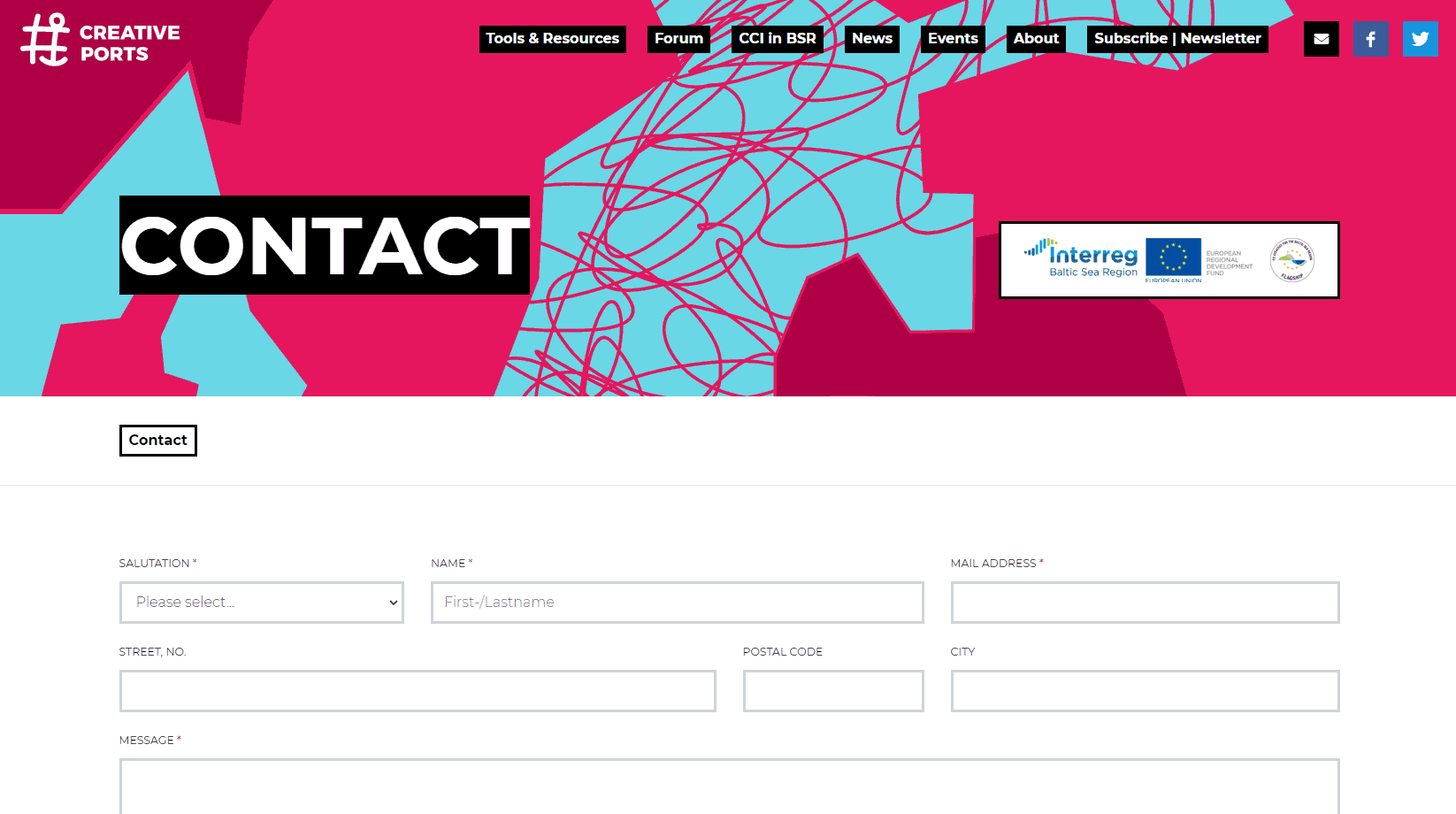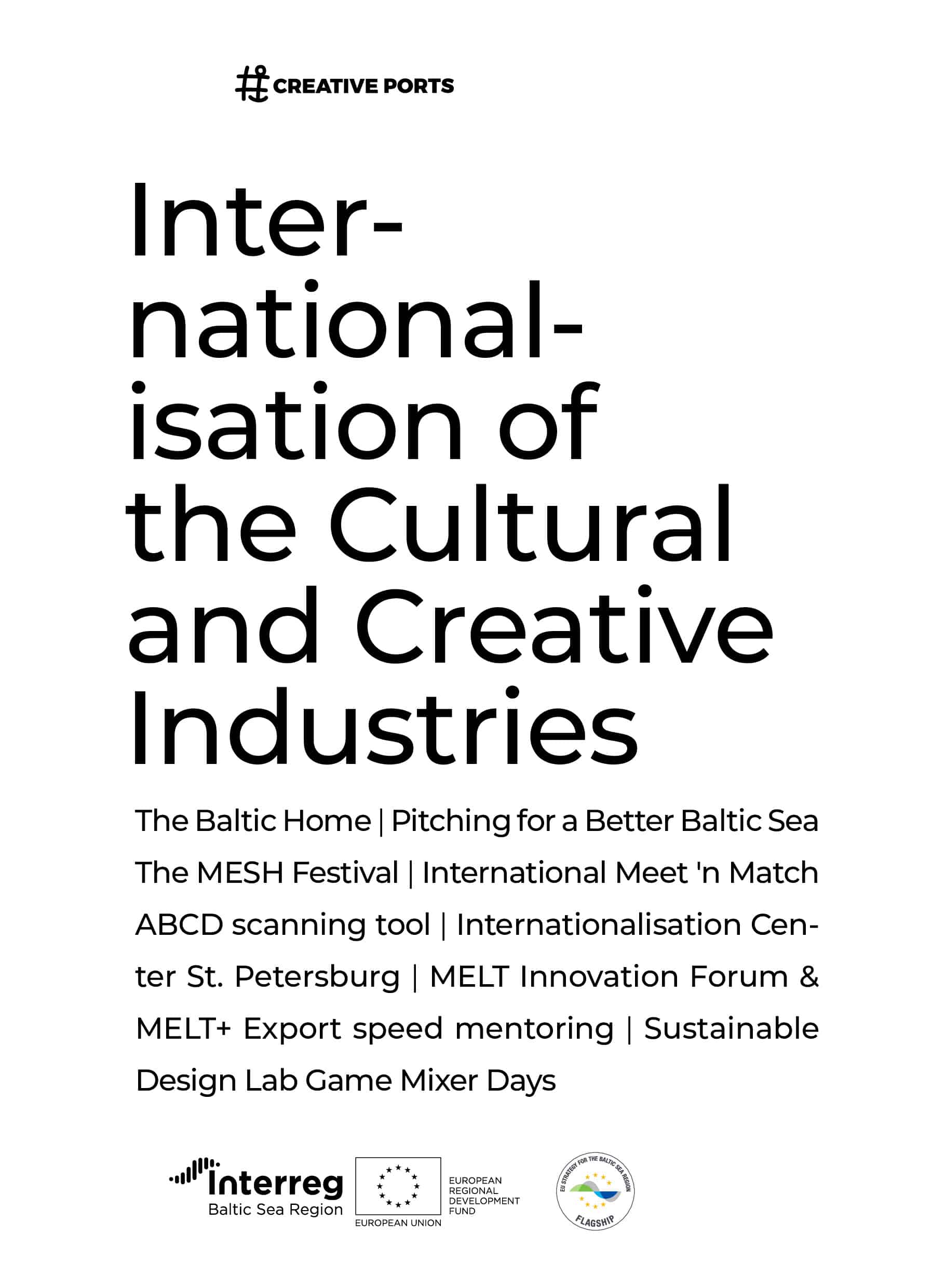Creative Ports
The Baltic Sea region is a model for developing an economy based on knowledge and innovation. Although the creative industries sector in the region is characterised by cultural diversity, it has not yet exhausted its export opportunities and transnational cooperation potential. In view of the high economic importance of the sector, public authorities, business development organisations and incubators have the task of supporting and facilitating the internationalisation of companies. However, they often lack sufficient international contacts and experience in cooperation processes. On the other hand, cultural institutes, transnational networks and NGOs are familiar with working on the international stage, but know less about the specific regional strengths, weaknesses and needs of the creative industries.
Bringing together complementary groups internationally
The Creative Ports project brought these different groups together and bundled their competences. 14 partners from the Baltic States - funding agencies, municipalities, international cultural institutes, universities - joined forces in a consortium led by Goethe-Institut, including the Hamburg Kreativ Gesellschaft, ARS BALTICA, the Danish Cultural Institute, the University of Technology Tallinn, Szczecin Media Design Association, Vilnius City or the platform for European-Russian innovation partnerships in St. Petersburg.
Budgets
in numbers
-
3.08MillionTotal
-
2.23MillionErdf
-
0.20MillionEni + Russia
-
0.00MillionNorway
Achievements
New creative approaches presented
As the Tallinn Business Incubators Foundation mentioned, Creative Ports has enabled the creation of new methods facilitating the internationalisation of the Cultural and Creative Industries (CCI). For example, “Baltic Home” and “Game Mixer Days” can be mentioned:
Baltic Home was a virtual pop-up exhibition of furniture and other interior objects in Szczecin, Poland. Baltic Home presented designers from Sweden, Denmark, Finland, Lithuania, Estonia, Germany and Poland. Learn more here https://www.creativeportscatalogue.eu/chapters/tool_1/
Game Mixer Days was an acceleration program for a new generation of game developers and studios. The program had two parts: a virtual international showcase including market information and a peer-learning format, https://www.creativeportscatalogue.eu/chapters/tool_10/
Planning for the future
But the results of Creative Ports do not stop at the end of the project. The board of the Goethe-Institut in Munich decided to allocate sufficient resources to the Goethe-Institut in Tallinn to facilitate the tandems and further activities: Stabilizing the Network, Communication, Maintenance of the Online-Platform as well as Monitoring CCI funding opportunities in the Baltic Sea region and development of further CCI projects.
Summing up, the Creative Ports project improved the exchange and internationalisation processes between public authorities, CCI support organisations and cultural intermediaries and networks. The partners jointly developed and tested formats for networking and training as well as methods of supra-regional cooperation. A publicly accessible learning platform documented the results and provided learning modules to share lessons learned. Companies and other players in the cultural and creative industries got access to opportunities for internationalisation and joint value creation.
Outputs
CCI Secretariat (Contact Desk)

Catalogue of the piloted internationalisation tools

Project Stories
Partners
Goethe-Institut
- TownMunich
- RegionMünchen, Kreisfreie Stadt
- CountryGermany
- RepresentativeIsabel Hölzl
- Phone
- E-Mail
- Web
Hamburg Kreativ Gesellschaft mbH
- TownHamburg
- RegionHamburg
- CountryGermany
- RepresentativeJenny Kornmacher
- Phone
- E-Mail
- Web
ARS BALTICA / Nordkolleg Rendsburg GmbH
- TownRendsburg
- RegionRendsburg-Eckernförde
- CountryGermany
- RepresentativeMarcus Hagemann
- Phone
- E-Mail
- Web
Danish Cultural Institute
- TownCopenhagen
- RegionByen København
- CountryDenmark
- RepresentativeOlaf Gerlach-Hansen
- Phone
- E-Mail
- Web
TalTech University
- TownTallinn
- RegionPõhja-Eesti
- CountryEstonia
- RepresentativeGunnar Prause
- Phone
- E-Mail
- Web
Tallinn Business Incubators Foundation
- TownTallinn
- RegionPõhja-Eesti
- CountryEstonia
- RepresentativeMari-Ann Meigo Fonseca
- Phone
- E-Mail
- Web
Creative Estonia NGO
- TownTallinn
- RegionPõhja-Eesti
- CountryEstonia
- RepresentativeEva Leemet
- Phone
- E-Mail
- Web
South-Eastern Finland University of Applied Sciences
- TownMikkeli
- RegionEtelä-Savo
- CountryFinland
- RepresentativeNatalia Narits
- Phone
- E-Mail
- Web
Vilnius City Municipality Administration
- TownVilnius
- RegionVilniaus apskritis
- CountryLithuania
- RepresentativeVeronika Jaruševičiūtė
- Phone
- E-Mail
- Web
Westpomeranian Region
- TownSzczecin
- RegionMiasto Szczecin
- CountryPoland
- RepresentativeOlga Łozińska
- Phone
- E-Mail
- Web
Media Dizjan / Szczecin Incubator of Art and Creative Industries
- TownSzczecin
- RegionMiasto Szczecin
- CountryPoland
- RepresentativeMonika Ewa Tomczyk
- Phone
- E-Mail
- Web
Filmby Aarhus
- TownAarhus
- RegionØstjylland
- CountryDenmark
- RepresentativeKirsten Langgaard
- Phone
- E-Mail
- Web
Media Evolution
- TownMalmö
- RegionSkåne län
- CountrySweden
- RepresentativeSara Ponnert
- Phone
- E-Mail
- Web
Non-commercial Partnership "European-Russian InnoPartnership"
- TownSt.Petersburg
- RegionCity of St. Petersburg
- Country
- RepresentativeMaria Kuzko
- Phone
- E-Mail
- Web
-
Project managerIsabel HölzlGoethe-Institut
-
Legal representativeRainer PollackGoethe-Institut
-
Financial managerTommi ReinikainenGoethe-Institut e.V.
-
Communication managerLars SchieberREM Consult



